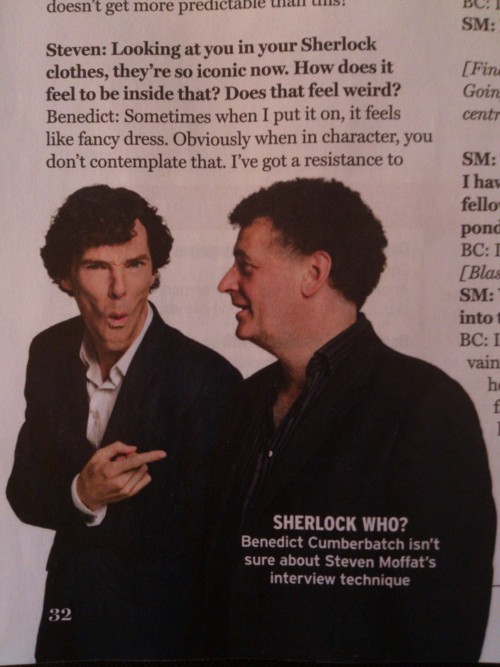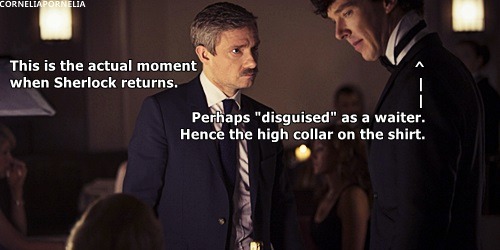Latest Posts by perditorian - Page 4
Long but worthwhile link.
So okay. In sum. Over the weekend, the Sherlock team held a screening of the next season's first episode with a Q&A. The moderator, a journalist who likes to appear edgy, took a derisive tone overall, saddling the stars with an impromptu reading of a fan-written story, and mocking the fans and the enterprise of fan fiction.
Two things about journalists/reporters/media.
Thing one: the dichotomy between fans who like to create work based on a popular show, and the people being paid to do so, isn't actually there. In this case, the show itself is fan fiction riffing on the original canon. And one of the showrunners has done work under a pseudonym. The media would like to have the story of two sides pitted against each other, but it really doesn't seem to exist. It seems to me that the problem is a chip on the shoulder of critics against creators.
Thing two: the non-stop press cavalcade needs to stop. There's an Internet. There's Skype. There are green screens. Even if you're not Beyonce and you need a bit of promotion, why on earth must artists be salesmen and go on rounds? I'd much prefer if they were able to focus on their job, and maybe did one long, relaxed interview. Cut that up and syndicate it for promotion, then put the whole thing in the extras to give people another reason to purchase. Let's maybe stop treating talent quite so much like performing monkeys and be grateful for the few artists who are actually gifted.
Saturday’s madness with the Empty House screening was the not just the last straw, but a turning point....
cumbertrekkie:
the wonderful women of Sherlock









Benedict Cumberbatch reading a letter by Alan Turing at the Letters Live event
I'm not sure if he's an actor so much as he's an utter chameleon.
This is amazing.
Hilarious! I think I peed!
I love sets of photos like this and this one is of course extra fab.


Catherine Slater @damasuerte 33m
@EmrysIsLove and here’s the photo! pic.twitter.com/g3ysdPxLcU
http://video.uk.msn.com/watch/video/msn-meets-martin-freeman/2tqcu0nd
Martin Freeman chats about his starring role as Bilbo Baggins in The Hobbit: The Desolation Of Smaug and answers fan questions via Skype.
In which Martin Freeman wears adorable socks and answers fan Skype questions in an unusually straightforward way.





sherlock in the christmas/new year issue of radio times...
Martin Freeman is my spirit animal.
Yes I did have to sing the entire thing to myself

Give it a second…
http://failnation.tumblr.com
All I really want out of life is Evangeline Lilly's updo


Martin and Benedict pointing at each other at the Hobbit premiere.
To unlock the locked content...
...mouse over the gravestone in the first scene of the trailer to find the lock. (It can be a bit tricky.)
When you do, enter the code 051113 - the code the bomber enters into the briefcase in one of the clips.
Videoey goodness!
Sherlock is alive and back 01.01.14 on BBC One. Unlock exclusive clips and pictures from series 3 in this interactive trailer.
The BBC trailer (linked here) is the same as the PBS one (previous post) - except unsurprisingly the BBC one is better - it's interactive with a feast of clips and goody goodness.
Also now I think the person who didn't matter might be Anderson.
But the real question is: how do you unlock the locked bits???
New trailer!
Who's the person he didn't think mattered? There's an argument for Mycroft, but I think it's Molly.
MASTERPIECE | Sherlock Returns Preview | PBS - YouTube







Always thinking of this from now on.
he’ll say “are you married?” we’ll say “wow those are pretty invasive questions for a snowman”
I guess that means I like my wine like I like my men: hot and grey.


23 years in between!

babybatch is adorable

OH MY GOD
THIS IS NOT A DRILL
MOLLY HOOPER HAS AN ENGAGEMENT RING ON
This... looks just about right actually. Well. Except for that mustache. That mustache will never look right.










My favourite game is 'Did Benedict dress himself today?'
For example
No:

Yes:

No:

Yes:

No:

Yes:

Lost ability to words. dhoihgflt.
Benedict Cumberbatch reads lyrics from R Kelly’s Genius [HD]
Interview Part 1 [HD] http://www.youtube.com/watch?v=IMleemiObG8#t
Interview Part 2 [HD] http://www.youtube.com/watch?v=uulrVsNkrzM
Now he's just fucking with us.

Writing Advice: by Chuck Palahniuk In six seconds, you’ll hate me. But in six months, you’ll be a better writer. From this point forward—at least for the next half year—you may not use “thought” verbs. These include: Thinks, Knows, Understands, Realizes, Believes, Wants, Remembers, Imagines, Desires, and a hundred others you love to use. The list should also include: Loves and Hates. And it should include: Is and Has, but we’ll get to those later. Until some time around Christmas, you can’t write: Kenny wondered if Monica didn’t like him going out at night…” Instead, you’ll have to Un-pack that to something like: “The mornings after Kenny had stayed out, beyond the last bus, until he’d had to bum a ride or pay for a cab and got home to find Monica faking sleep, faking because she never slept that quiet, those mornings, she’d only put her own cup of coffee in the microwave. Never his.” Instead of characters knowing anything, you must now present the details that allow the reader to know them. Instead of a character wanting something, you must now describe the thing so that the reader wants it. Instead of saying: “Adam knew Gwen liked him.” You’ll have to say: “Between classes, Gwen had always leaned on his locker when he’d go to open it. She’s roll her eyes and shove off with one foot, leaving a black-heel mark on the painted metal, but she also left the smell of her perfume. The combination lock would still be warm from her butt. And the next break, Gwen would be leaned there, again.” In short, no more short-cuts. Only specific sensory detail: action, smell, taste, sound, and feeling. Typically, writers use these “thought” verbs at the beginning of a paragraph (In this form, you can call them “Thesis Statements” and I’ll rail against those, later). In a way, they state the intention of the paragraph. And what follows, illustrates them. For example: “Brenda knew she’d never make the deadline. was backed up from the bridge, past the first eight or nine exits. Her cell phone battery was dead. At home, the dogs would need to go out, or there would be a mess to clean up. Plus, she’d promised to water the plants for her neighbor…” Do you see how the opening “thesis statement” steals the thunder of what follows? Don’t do it. If nothing else, cut the opening sentence and place it after all the others. Better yet, transplant it and change it to: Brenda would never make the deadline. Thinking is abstract. Knowing and believing are intangible. Your story will always be stronger if you just show the physical actions and details of your characters and allow your reader to do the thinking and knowing. And loving and hating. Don’t tell your reader: “Lisa hated Tom.” Instead, make your case like a lawyer in court, detail by detail. Present each piece of evidence. For example: “During roll call, in the breath after the teacher said Tom’s name, in that moment before he could answer, right then, Lisa would whisper-shout ‘Butt Wipe,’ just as Tom was saying, ‘Here’.” One of the most-common mistakes that beginning writers make is leaving their characters alone. Writing, you may be alone. Reading, your audience may be alone. But your character should spend very, very little time alone. Because a solitary character starts thinking or worrying or wondering. For example: Waiting for the bus, Mark started to worry about how long the trip would take…” A better break-down might be: “The schedule said the bus would come by at noon, but Mark’s watch said it was already 11:57. You could see all the way down the road, as far as the Mall, and not see a bus. No doubt, the driver was parked at the turn-around, the far end of the line, taking a nap. The driver was kicked back, asleep, and Mark was going to be late. Or worse, the driver was drinking, and he’d pull up drunk and charge Mark seventy-five cents for death in a fiery traffic accident…” A character alone must lapse into fantasy or memory, but even then you can’t use “thought” verbs or any of their abstract relatives. Oh, and you can just forget about using the verbs forget and remember. No more transitions such as: “Wanda remembered how Nelson used to brush her hair.” Instead: “Back in their sophomore year, Nelson used to brush her hair with smooth, long strokes of his hand.” Again, Un-pack. Don’t take short-cuts. Better yet, get your character with another character, fast. Get them together and get the action started. Let their actions and words show their thoughts. You—stay out of their heads. And while you’re avoiding “thought” verbs, be very wary about using the bland verbs “is” and “have.” For example: “Ann’s eyes are blue.” “Ann has blue eyes.” Versus: “Ann coughed and waved one hand past her face, clearing the cigarette smoke from her eyes, blue eyes, before she smiled…” Instead of bland “is” and “has” statements, try burying your details of what a character has or is, in actions or gestures. At its most basic, this is showing your story instead of telling it. And forever after, once you’ve learned to Un-pack your characters, you’ll hate the lazy writer who settles for: “Jim sat beside the telephone, wondering why Amanda didn’t call.” Please. For now, hate me all you want, but don’t use thought verbs. After Christmas, go crazy, but I’d bet money you won’t. (…) For this month’s homework, pick through your writing and circle every “thought” verb. Then, find some way to eliminate it. Kill it by Un-packing it. Then, pick through some published fiction and do the same thing. Be ruthless. “Marty imagined fish, jumping in the moonlight…” “Nancy recalled the way the wine tasted…” “Larry knew he was a dead man…” Find them. After that, find a way to re-write them. Make them stronger.
Gorgeous and hard and so worth doing.
I like my writing advice like I like my men.
(rimshot)
This last picture. Because Martin Freeman is a desperately good actor... but there are clearly times where he does not bother to act interested.

















